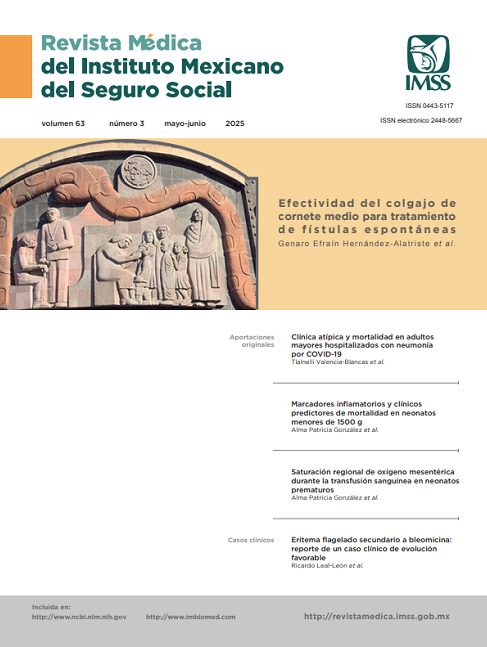Association of serum vitamin D and acute renal graft dysfunction
Main Article Content
Keywords
Kidney Transplantation, Vitamin D, Renal Insufficiency, Chronic
Abstract
Background: Chronic kidney disease (CKD) is a clinical entity characterized by definitive or non-reversible deterioration of the kidney’s architecture and/or its functional status. Renal transplantation is the treatment of choice for CKD. New pharmacological therapies have been investigated with the aim of reducing the risk of renal graft rejection; an example of this is vitamin D. However, international evidence presents mixed results.
Objective: To evaluate the relationship between serum vitamin D levels and the prevalence of acute renal graft dysfunction in renal transplant patients.
Material and methods: A prospective, observational and comparative study was carried out with a population of patients who underwent renal transplantation. The patients were classified into 2 groups: group 1: patients with acute graft dysfunction, and group 2, those without acute graft dysfunction.
Results: A statistically significant relationship was found between acute renal graft dysfunction and serum vitamin D levels (p = 0.003). All other characteristics did not show a statistically significant relationship with acute renal graft dysfunction.
Conclusions: Low 25-hydroxyvitamin D levels showed a statistically significant association with acute renal graft dysfunction.
References
Ammirati AL. Chronic kidney disease. Rev Assoc Med Bras. 2020;66(Suppl1):S3-9.
García-Maset R, Bover J, Segura de la Morena J, et al. Documento de información y consenso para la detección y manejo de la enfermedad renal crónica. Nefrología. 2022;42(3):233-64.
Agudelo-Botero M, Valdez-Ortiz R, Giraldo-Rodríguez L, et al. Overview of the burden of chronic kidney disease in Mexico: Secondary data analysis based on the Global Burden of Disease Study 2017. BMJ Open. 2020;10(3).
Kramer H. Diet and Chronic Kidney Disease. Adv Nutr. 2019;10(Suppl_4):S367-S379. doi: 10.1093/advances/nmz011
Carney EF. The impact of chronic kidney disease on global health. Nat Rev Nephrol. 2020;16(5):251. doi: 10.1038/s41581-020-0268-7
Vasquez-Jimenez E, Madero M. Global Dialysis Perspective: Mexico. Kidney360. 2020;1(6):534-537. doi: 10.34067/KID.0000912020
Tang Z, Yu S, Pan Y. The gut microbiome tango in the progression of chronic kidney disease and potential therapeutic strategies. J Transl Med. 2023;21(1):689. doi: 10.1186/s12967-023-04455-2
Johnson RJ, Sánchez-Lozada LG, Newman LS, et al. Climate Change and the Kidney. Ann Nutr Metab. 2019;74 Suppl 3:38-44. doi: 10.1159/000500344
Sawinski D, Poggio ED. Introduction to Kidney Transplantation: Long-Term Management Challenges. Clin J Am Soc Nephrol. 2021;16(8):1262-3. doi: 10.2215/CJN.13440820
Hariharan S, Israni AK, Danovitch G. Long-Term Survival after Kidney Transplantation. N Engl J Med. 2021;385(8):729-743. doi: 10.1056/NEJMra2014530
Ahmadpoor P, Ilkhanizadeh B, Ghasemmahdi L, et al. Effect of active vitamin D on expression of co-stimulatory molecules and HLA-DR in renal transplant recipients. Exp Clin Transplant. 2009;7(2):99-103.
Messa P, Regalia A, Alfieri CM. Nutritional vitamin D in renal transplant patients: Speculations and reality. Nutrients. 2017;9(6). doi: 10.3390/nu9060550
Awadain WH, Mohamad EM, Almessallamy FA, et al. Prevalence of Hypovitaminosis D among Renal Transplant Recipients and Its Relation to Graft Interstitial Fibrosis. Zagazig University Medical Journal. 2019;25(5):748-58. Disponible en: https://zumj.journals.ekb.eg/article_46487_ec841f948443bfdbd0ee016336805e19.pdf
B Argentino AC, Souza JF, Dos Santos Sens YA. Evaluation of the anthropometric clinical measurements and Vitamin D status in kidney transplant recipients: Comparison between sexes. Saudi J Kidney Dis Transpl. 2019;30(1):24-32
Buyukdemirci S, Oguz EG, Cimen SG, et al. Vitamin D deficiency may predispose patients to increased risk of kidney transplant rejection. World J Transplant. 2022;12(9):299-309. doi: 10.5500/wjt.v12.i9.299
Mehrotra S, Sharma RK, Gupta A, et al. Low 25(OH) Vitamin-D levels are associated with inferior graft function in living related kidney transplant recipients. J Renal Inj Prev. 2018;7(4):224-9.
Hesketh CC, Knoll GA, Molnar AO, et al. Vitamin D and kidney transplant outcomes: a protocol for a systematic review and meta-analysis. Syst Rev. 2014;3:64. doi: 10.1186/2046-4053-3-64
18. Filipov JJ, Dimitrov EP. Vitamin D After Kidney Transplantation: Metabolism and Clinical Importance. EMJ Nephrol. 2017;5(1):75-82. doi: 10.33590/emjnephrol/10311600
Astor BC, Djamali A, Mandelbrot DA, et al. The association of 25-hydroxyvitamin D levels with late Cytomegalovirus infection in kidney transplant recipients: The Wisconsin allograft recipient database: The Wisconsin allograft recipient database. Transplantation. 2019;103(8):1683-8. doi: 10.1097/TP.0000000000002672
Regalia A, Benedetti M, Malvica S, et al. Vitamin D status and SARS-CoV-2 infection in a cohort of kidney transplanted patients. Nutrients. 2022;14(2):317. doi: 10.3390/nu14020317
Messa P, Castellano G, Vettoretti S, et al. Vitamin D and calcium supplementation and urolithiasis: A controversial and multifaceted relationship. Nutrients. 2023;15(7):1724. doi: 10.3390/nu15071724
Bargagli M, Ferraro PM, Vittori M, et al. Calcium and vitamin D supplementation and their association with kidney stone disease: A narrative review. Nutrients. 2021;13(12):4363. doi: 10.3390/nu13124363
Quach K, Abdelmasih M, Chen PX, et al. Vitamin D levels and the risk of posttransplant diabetes mellitus after kidney transplantation. Prog Transplant. 2021;31(2):133-41. doi: 10.1177/15269248211002796
Courbebaisse M, Bourmaud A, Souberbielle JC, et al. Nonskeletal and skeletal effects of high doses versus low doses of vitamin D3 in renal transplant recipients: Results of the VITALE (VITamin D supplementation in renAL transplant recipients) study, a randomized clinical trial. Am J Transplant. 2023;23(3):366-76. doi: 10.1016/j.ajt.2022.12.007


